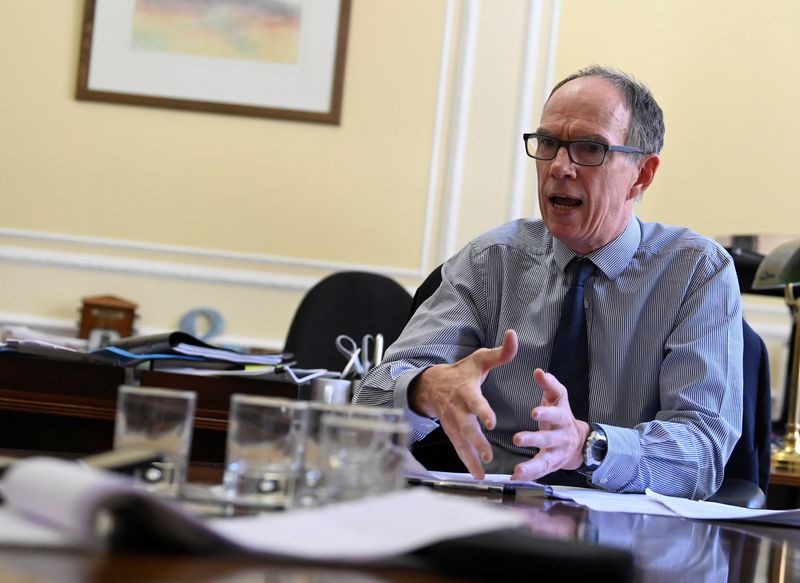By Andy Bruce and William Schomberg
LONDON (Reuters) - The Bank of England would press on with plans to gradually sell its vast stock of British government bonds even if an economic slowdown eventually forces it to cut interest rates, Deputy Governor Dave Ramsden said.
The BoE is primed to become the first major central bank to sell some of the bonds it purchased during more than a decade of quantitative easing (QE), with a 40 billion-pound ($49 billion) sales programme likely to start next month.
Ramsden, in charge of the BoE's roughly 1 trillion pound balance sheet, told Reuters it was "more likely than not" that borrowing costs would need to rise again after the BoE raised Bank Rate by 50 basis points to 1.75% last week.
But, in an interview, he also acknowledged financial market expectations that the recession forecast by the Bank could force it to reverse course on rates next year - a scenario Ramsden said was not his forecast but he was "certainly not ruling out".
Even in this situation, the process of selling gilts - or quantitative tightening (QT) - could continue, Ramsden said.
"I think that's consistent with the way we communicated things, that we'll carry on with the pace of QT in the background," Ramsden said, speaking in his office at the BoE.
Last week the BoE said it would have a "high bar" for halting its QT bond sales in the event of economic or financial market turmoil.
The BoE does not expect the gilt sales to play a big role in tightening monetary conditions - unlike moves in interest rates or the initial purchases of the bonds - but it wants to ensure it can undertake asset purchases again in future if needed.
"I think by embarking on QT, that does at the margin impart some further monetary tightening, but it's in the background compared to Bank Rate," Ramsden said.
QT, like its mirror policy QE, was likely to be state contingent, Ramsden said - meaning that its effects would vary depending on the condition of financial markets and the economy.
HSBC economists said last week the sales should not have much impact on gilt yields "if well communicated" but they also warned there was a risk of volatility due to a lack of short-dated gilts in Britain's repo market.
Ramsden said the Bank was aware of this through its market contacts. Although it had tried to be as clear as possible about its QT plans, the BoE will be watching how the market responds to its gilt sales, he said.
"There may be an effect when we actually come to sell and you may see prices move somewhat. But when we're doing this, remember we're talking about 10 billion pounds a quarter... That's consistent with being gradual and predictable," Ramsden said.
RUNNING DOWN RESERVES
The BoE's stock of reserve liabilities stood at 947 billion pounds as of last Wednesday.
Asked how far the BoE's balance sheet could shrink through QT, he said current demand for central bank reserves was probably slightly less than half the BoE's stock right now, based on feedback from financial sector firms.
"So if you like, that's the demand that we will approach in terms of reducing our stock of gilts, but over a number of years," Ramsden said.
Alongside its QT plans, the BoE last week announced a new short-term repo (STR) facility to ensure banks can access reserves they need as they are drained away gradually by the QT process.
While the prospect of a shortage of reserves was some years away, the STR would be ready the moment gilt sales start, Ramsden said.

"We want it to be used and we'll do everything we can to make sure that there's not any kind of stigma around it," he said.
($1 = 0.8244 pounds)